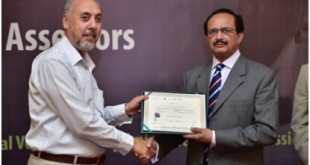LAHORE, Oct 15, 2014: Two Pakistani and one German  university on Wednesday launched the B.Ed in Technical Education, which is a pre-service study programme to produce a new generation of teachers imparting technical and vocational education and training (TVET) for the first time in Pakistan.
university on Wednesday launched the B.Ed in Technical Education, which is a pre-service study programme to produce a new generation of teachers imparting technical and vocational education and training (TVET) for the first time in Pakistan.
The one-year post graduate study programme is a venture of the University of the Punjab, the Virtual University of Pakistan and the Technical University of Kaiserslautern, which is one of the leading German universities for TVET teacher study programmes.
Introduction of this new study programme is part of a comprehensive reform being spearheaded by the National Vocational and Technical Training Commission (NAVTTC) through TVET Reform Support Programme, which is co-funded by the European Union, the Embassy of the Kingdom of Netherlands, the Royal Norwegian Embassy and the Federal Republic of Germany and being implemented by the Deutsche Gesellschaft Internationale Zusammenarbeit (GIZ) GmbH.
The new study programme was launched at a ceremony held at University of Punjab, where a large number of government officials and people from academia were present. Vice Chancellor Punjab University Dr. Mujahid Kamran, Rector Virtual University Prof. Dr. Naveed Malik, Executive Director NAVTTC Khalid Hanif, Director General NAVTTC Muhammad Yahya, First Secretary Economic Cooperation and Development German Embassy Almut Knop and Coordinator TVET Reform Support Programme Hans Bruns spoke on the occasion.
Dr. Mujahid Kamran formally launched the programme.
The B.Ed in Technical Education is a pilot programme and is oriented to train a “new generation of TVET teachers”. One of the main aspects of the study programme is to offer an attractive academic qualification/degree both with relevant technical and pedagogical competences.
The B.Ed aims to the develop a competence-based qualification programme covering the needed professional competences of TVET teachers with respect to theoretical knowledge, practical skills, teaching capacity and methodological competence. This study programme will improve the teaching quality and will also have a sustainable impact on the TVET system in Pakistan.
The innovative feature of this study programme is the combination of four phases, which will make the difference. In the first phase, the students will get sound knowledge of methodological and pedagogical aspects of teaching in TVET; during the second phase they will gain practical experience in teaching in combination with structured theoretical reflection (internship in TVET institutions).
In the third phase, the students will experience the world of work by working for some weeks in companies (internships in companies). Phase for is rather ongoing and represents various self-learning phases during which the students are exposed to tutored self-learning, e-learning, and the submission of assignments. This phase is based on the internet platform of the Virtual University.
 Pakistan TVET REFORM Support Programme Technical and Vocational Education and Training (TVET) Reform support Programme
Pakistan TVET REFORM Support Programme Technical and Vocational Education and Training (TVET) Reform support Programme






